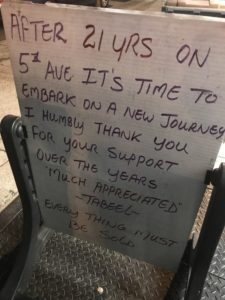 Rising rents in a gentrifying neighborhood forces small businesses to shutter; it’s a recurring story throughout New York City. But while the economics of gentrification and its impacts on small businesses are often talked about, there’s a different kind of story playing out on Fifth Avenue in Park Slope. Tabeel Rush, owner of Tabeel Aromatherapy, is leaving after twenty-one years not because of the rent, but because the culture of the neighborhood has changed too much.
Rising rents in a gentrifying neighborhood forces small businesses to shutter; it’s a recurring story throughout New York City. But while the economics of gentrification and its impacts on small businesses are often talked about, there’s a different kind of story playing out on Fifth Avenue in Park Slope. Tabeel Rush, owner of Tabeel Aromatherapy, is leaving after twenty-one years not because of the rent, but because the culture of the neighborhood has changed too much.
Rush, 60, is originally from Grenada, and first came to Park Slope in 1982. She opened her business in December of 1996 on the corner of 5th Avenue and St. Marks Street. The neighborhood was different then. “Most of the businesses on this street were owned by blacks or Hispanics. It wasn’t the safest neighborhood, but it had its own culture,” she said. “Once wealth moved into the neighborhood, they had to sell their houses and close down their businesses because they couldn’t afford rent.”
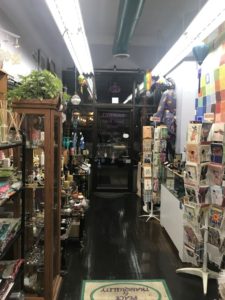 The shop’s narrow, rectangular frame is lined with natural beauty products, incense and aromas, ethnic greeting cards, and jewelry reflecting a diversity of cultures. In a corner of the shop, Indian incensed burned next to a Buddha shaped candle that sat aside two mannequins dressed in colorfully-patterned Ethiopian dresses, all below the flag of Grenada hanging from the ceiling above. Rush orders her merchandise from all over the world, and that diversity and authenticity is on display.
The shop’s narrow, rectangular frame is lined with natural beauty products, incense and aromas, ethnic greeting cards, and jewelry reflecting a diversity of cultures. In a corner of the shop, Indian incensed burned next to a Buddha shaped candle that sat aside two mannequins dressed in colorfully-patterned Ethiopian dresses, all below the flag of Grenada hanging from the ceiling above. Rush orders her merchandise from all over the world, and that diversity and authenticity is on display.
But other parts of Rush’s business are not on display. At least not for everyone. A sliding door separates the store into an aromatherapy shop in the front and a hair salon in the back. When the store first opened in 1996, Rush was partnered with another woman who was supposed to run the storefront while Rush ran the hair salon in the back. In 1997, a year after the opening, Rush’s partner left the business and that’s when Rush turned the front into an aromatherapy shop. The opaque sliding glass door still remains, keeping the the aromatherapy shop separated from the hair salon.
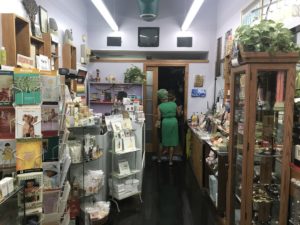
Rush specializes in natural dreadlock styles. She’s disciplined in her Rastafarian religious morals and will only dreadlock those who have the hair type for natural dreadlocks. Rush said she has people coming to her all the time wanting fake dreadlocks, also known as “fauxlocs”, which are a trend that allows people to have dreadlocks with fake hair supplements. In 2002, two Caucasian woman threatened to sue Rush for discriminating against them because she refused to dreadlock their hair. “I told them I could prove my point in court. I can’t dreadlock anyone who doesn’t already have a natural curl pattern, and they never went through with it after that,” she said.
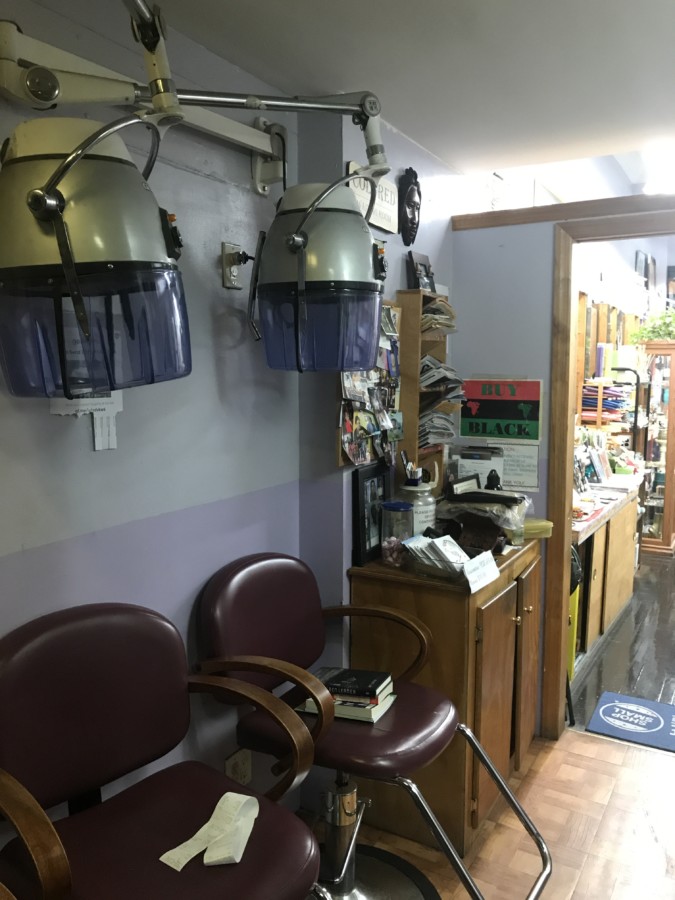
The sliding door’s purpose is much more than a divider between the shop and the salon. It serves to keep the unique culture of the salon apart from those who Rush believes would try to imitate it. “People are lost. Black America doesn’t have a culture, everyone’s gravitating to everyone else’s culture.” Rush keeps a personal relationship with her clients and makes her small, cozy salon a place of comfort for those embarking on their dreadlock journeys. “I also have the door because people who get dreads don’t always want people seeing them,” she said. One can only imagine how long Rush’s dreadlocks are because she keeps them tied up in a head wrap due to religious reasons. “I have two sons, and only one has seen me with my hair down, and that was by accident.” Rush is known around Park Slope for staying true to her cultural values. “One of my longtime customers who’s lived here even before my shop opened said the other day, ‘For as long as I’ve known you, I’ve never seen you without a hair wrap.”
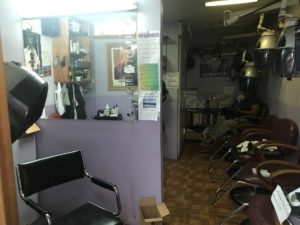
Her quaint salon is a commonplace for her clients. Some come by just to enjoy the company and join in on interesting conversation. The salon has two hair-washing sinks, five hair dryers that sit along the wall and only one chair for styling since Rush is the one and only stylist of her shop. The walls are lined with Afro-centric paraphernalia, Rastafarian colors, and a section where she keeps all the personal pictures her 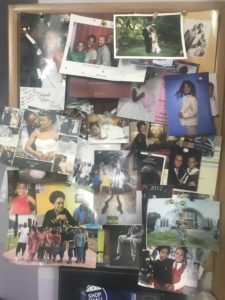 clients gave her. There are wedding announcements, baby pictures and yearbook pictures. Rush appears in some photos, with her clients, at various event around Brooklyn. But all that is changing, Rumbi Zai, a client since 2010, had Rush style her and her family’s dreadlocks for her wedding back in 2012. “When she told me she was leaving I was like…uhh…what am I going to do? We have to talk about this,” Zai said.
clients gave her. There are wedding announcements, baby pictures and yearbook pictures. Rush appears in some photos, with her clients, at various event around Brooklyn. But all that is changing, Rumbi Zai, a client since 2010, had Rush style her and her family’s dreadlocks for her wedding back in 2012. “When she told me she was leaving I was like…uhh…what am I going to do? We have to talk about this,” Zai said.
October 31st is the end of Rush’s lease, and marks the beginning of her next journey which she mentioned will be full of travel before returning to Grenada. She reflected on her time in Park Slope as a learning experience. “I learned a lot about myself. Things aren’t random. They happen for a reason, and I’m just picking up and moving on.”

Leave a Reply